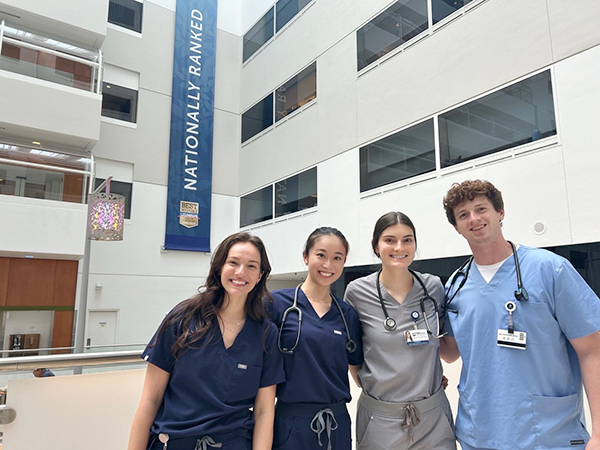Report of Sidney Kimmel Medical College at Thomas Jefferson University
Clinical Training report
Ms. Setsuko HARA
- Country / Regions
- United State of America
- School
- Sidney Kimmel Medical College at Thomas Jefferson University (USA)
- Elective period
- 28th July to 1st August 2025
- Program
- International Exchange Program
My clinical observership at Thomas Jefferson University Hospital was indeed an unforgettable experience. Reflecting on the remarkable days I spent there, I am grateful to all who embraced me, the doctors, the medical students and the patients of Jefferson. I also appreciate the Japanese organizers and doctors for giving me this opportunity.
During my clinical rotations, I came to realize that the role of a medical student in the United States extends far beyond passive observation. In many settings, students are contributors to the medical team. It challenged me to assume greater responsibility and to cultivate the clinical judgment and communication skills required in real-world medical practice. What I remember so well about my training is describing patients’ conditions to the attending physicians. In the United States, medical students are required to give great and speedy presentations and really get involved in the discussion. In addition, I performed physical examinations and took part in critical safety protocols, such as reading patients’ name tags aloud to confirm their identity before surgeries and procedures. Although these tasks appear routine, they heightened my sense of professional responsibility and strengthened my awareness of being a member of the clinical team. They were far more than academic exercises. These experiences taught me that patients begin to trust us long before any formal title is earned. We can build that trust by being present, paying attention, and showing a genuine willingness to help.
A small but powerful moment that represented the spirit of American clinical practice was the way each examination began and ended with a handshake. It was so simple. However, it built equality between the patient and the doctor. I experienced these moments, I realized we should look at the patients not just as a collection of symptoms or medical diagnosis but as human beings. That handshake became, for me, a symbol of the relationship at the core of medicine. That became an unspoken promise to listen, to care, and to be present.
I experienced cases and operations which I had never seen in Japan, such as Hyperthermic Intraperitoneal Chemotherapy (HIPEC) and rare conditions like Adenoid Cystic Carcinoma of the breast. In addition to my clinical observations, I joined the volunteer community through JeffHOPE, a program run by students at Jefferson. I helped homeless people get free health insurance and use the health-care system. This work gave me direct experience of how the social determinants of health can dramatically influence health as well as how systemic blocks can obstruct vulnerable populations from accessing necessary care. Contributing to these efforts deepened my empathy and strengthened my commitment to promoting equitable healthcare delivery.
Looking back on these experiences, I feel fortunate to have been surrounded by so many inspiring doctors and medical students. I am determined to make the most of the experiences I have gained in the United States and to pursue a career that consistently upholds a global perspective. I would like to conclude by expressing my sincere gratitude to all those who have supported me throughout this journey.
